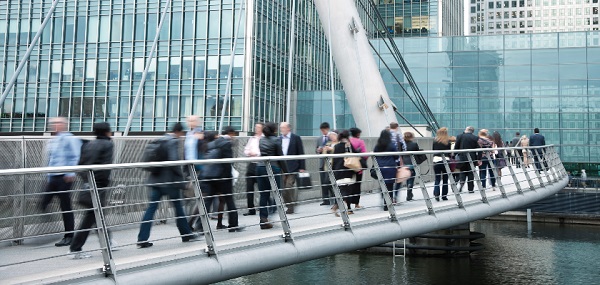Why You Need To Stop Being So Busy, Now

What’s your default response when someone asks you how you are? I’m willing to bet that it’s something along the lines of “I’m fine thanks, just really busy”. It just rolls off the tongue doesn’t it? Almost like a stock response that we automatically say without even thinking about it. Being busy is a badge of honour, we wear it with pride.
However, what we wouldn’t dream of responding with is, “I’m great thanks, I’ve decided to park a few projects so I that can focus on strategy”, or “I’m fine thanks, things have been fairly quiet this week, so I’m taking some quality thinking time to plan for the next quarter.”
It’s almost as if in today’s working culture, consciously pausing to take time away from delivering, to stop, think and reflect is frowned upon. If we’re not seen to be busy working on tasks and run off our feet, then we’re not seen to be providing value. And not feeling valuable or successful doesn’t feel good – so we do everything we can to busy ourselves, so we don’t have to feel that way.
It seems to now be an accepted cultural norm that being busy automatically equates to productivity and success, so being busy is something we all strive for. But have we got it all wrong?
Why now is the time to stop being so busy, all the time
The world of work is a busy, non-stop place to be. Sometimes it can feel like an exhausting, never-ending treadmill of busyness – one that it isn’t always easy to get off. Of course, there are times when we will be busy, there’s no getting away from that – but we shouldn’t be relentlessly plodding away on the treadmill all the time just for the sake of appearing to be busy and for all the perceived ‘benefits’ this brings us.
Instead, we need to consciously step off the treadmill now and again. We need to give ourselves the space and time to think, so that we are in the best position possible to be truly productive, innovative and plan how to deliver results. Yes, your day-to-day tasks will still need to be delivered, but it is worth stepping back now and again to spend some time really thinking about ‘how’ these tasks will be delivered in the best possible way.
So, if, admittedly, you’ve all too often succumbed to the curse of being busy, and are just going through the motions every day, then now is the time to change that. After all, this era of unprecedented change that we’re all trying to navigate, demands our full attention, and therefore will require us to stop, reset and re-calibrate more often. Below, I’ve plotted out what I think are some of the benefits of breaking the busyness and pressing pause now and again:
-
You’ll focus on what matters the most, and get better at prioritising
If your to-do list seems to be never-ending, and you’re busy trying to deal with 101 things all at once, then the likelihood is that you’re probably not really dealing with any of them properly, or if you are, it’s taking you longer than it should be.
Not only that, but if you’re busying yourself with being busy, then you’re probably actually trying to avoid starting work on that strategic project that has been sitting on your desk for weeks – that project that has the potential to add far more business benefit (and generate far more kudos for you) in the longer term.
By carving out some time to stop with all the busyness, and take a step back, you’ll be much better equipped to focus on what really matters and prioritise from there. Freeing up some time to think will also lift that mental fog that comes with having to spin lots of plates at the same time, and help you see things more clearly.
-
You’ll come up with better and better ideas, more regularly
The world of work is changing so rapidly that simply maintaining the status quo by busying yourself with tasks that you’ve always done – tasks that without question have been part of your daily routine – isn’t an option anymore.
Great ideas and creativity are what really fuels the success of businesses, so you need to ensure that, as a leader, you’re in the best position you can be to be creative and come up with those game-changing ideas. Pausing the daily grind, even just for a few minutes, and doing something completely different can be hugely powerful here.
If you think about it, it’s those times when we feel a real sense of space and clarity – when we’re disconnected from the day-to-day – that our minds are free to come up with our best ideas. Many of our ‘light bulb’ moments come when we’re not even at work – they come when we’re relaxed and ‘off-peak’- not when we’re constantly being pulled from pillar to post, just trying to keep the cogs in the machine running.
This is because it’s times such as these which encourage a mental state called the ‘default mode network’ – which allows us to become less aware of our environment, and more aware of our internal thoughts, as explained by psychologist, John Kounios in this Wired article. This allows the mind to think in non-linear ways, sparking creative thinking and problem solving.
So, by proactively disconnecting from our work sometimes, and freeing our minds, we’ll be far better equipped to think in non-linear ways and therefore come up with the best ideas we can. It’s those ideas that are the real indicator of success in the future world of work, not how ‘busy’ we are. The sooner we realise that, the better.
-
You’ll be far better able to plan for, and adapt to change
If we’re prone to operating in autopilot mode, within the confines of our own comfort zones, being endlessly busy all the time, then we risk never fully opening our eyes to all the change that is on the horizon. And if we can’t see or foresee this change, how on earth will we be able to prepare for it and adapt to it?
It’s important to lift our heads above the parapet and stop to read, listen and watch all the change that is going on around us. If we do, then we’ll be far more capable of adapting to it. If we don’t, and instead, do everything in our power to ‘busy’ ourselves, then we’ll simply become blind to it. Which is the better option?
So, in the long run, spending time to educate yourself and to open both your eyes and your mind now and again, is far more valuable than ticking ten things off your to-do list every hour, in a bid to be seen as busy and successful.
-
You’ll be learning new, relevant skills more regularly, and so will your team
As I said in my previous blog, the mind is a muscle – so if it’s constantly busy operating within its comfort zone, never really being stretched or challenged, it won’t develop. After all, how can you expect your mind to grow when it’s just busy being tasked with the same things, day in day out? The very act of taking a pause to think and reflect can help you change all that. Periodic pauses will help you start to see things from a different perspective and establish different patterns of thinking. This is a skill in itself, and one that you need to keep practising.
Also, on a more literal level, by neglecting to take some time out now and again to think about and reflect on the direction of your team, or the strategy for the next financial year, then you risk working on the same things day-in-day out, never pushing things forward, and thus never really developing yourself as an individual.
Not only that, but by never pausing and reflecting, you’ll be far less able to assess the current skills of both yourself and your team or predict the skills that will be needed to ensure success in the future.
-
You’ll feel happier and more fulfilled
Consciously taking the time to let your mind find the space to think more strategically and look to the future can be hugely fulfilling and motivating. Not only will this allow you to feel more proactively connected to the bigger picture and wider purpose of your organisation, but you’ll also feel more engaged in your work, which, of course can ever only be a good thing. Not only that, but research shows that a positive mindset can allow your brain to think more creatively too – and creativity is what the world of work desperately needs more of.
The mind is a powerful thing. I strongly believe, as I’ve written about before, that by approaching our work with a mindset of growth will ultimately make you more successful. Allowing your mind to pause is an incredibly important part of this process. Not only will these moments of respite and reflection make you feel more mentally healthy, but they’ll help frame your thinking in the right way, enabling you to tackle problems and challenges proactively, with a growth mindset, whilst making the right strategic decisions for your business.
This may feel like quite a simplistic, and almost obvious topic – but sometimes it’s the simple things we all need reminding of now and again – especially during changing, challenging times such as these. Being busy has almost become our identity – we think the busier we are, the more impressive we seem – it’s a story we tell ourselves every day. Now is the time we changed all that.
I think it’s becoming more important than ever that we try to ‘un-busy’ ourselves, so that we have the space and time to plan for, and adapt to, all this change around us – so that we can learn new skills and come up with the best ideas we can. No longer should ‘busy’ be seen as a badge of honour, something to be proud of or even boast about. Instead, it’s time we all got into the habit of stopping and pausing once in a while – after all, making the time to think is where we’ll find the real route to success.
For my next blog, I’ll be taking this topic one step further by providing some practical advice to help readers proactively un-busy their working lives – which I know from experience is sometimes easier said than done. So, I’d love to hear about your personal experiences – do your best ideas come to you in the most unlikely of places? What do to you do refocus your mind on what really matters? How have you stopped yourself being busy working on the wrong things?
Did you enjoy this? You might like:
- The future of leadership in technology
- Six Soft Skills You Will Need In The Next Era Of Work
- The Best Way To Onboard Your New Starters Remotely
- What Employers Need To Know About GEN Z
AUTHOR

ALISTAIR COX
Chief Executive, Hays
Chief Executive, Hays
Alistair has been the CEO of Hays, plc since Sept. 2007. An aeronautical engineer by training (University of Salford, UK, 1982), Alistair commenced his career at British Aerospace in the military aircraft division. From 1983-1988, he worked Schlumberger filling a number of field and research roles in the Oil & Gas Industry in both Europe and North America. He completed his MBA (Stanford University, California) in 1991 and returned to the UK as a consultant for McKinsey & Co. His experience at McKinsey & Co covered a number of sectors including energy, consumer goods and manufacturing.
He moved to Blue Circle Industries in 1994 as Group Strategy Director, responsible for all aspects of strategic planning and international investments for the group. During this time, Blue Circle re-focused its business upon heavy building material in a number of new markets and in 1998, Alistair assumed the role of Regional Director responsible for Blue Circle’s operations in Asia, based in Kuala Lumpur in Malaysia. He was responsible for businesses in Malaysia, Singapore, the Philippines, Indonesia and Vietnam. Subsequent to the acquisition of Blue Circle by Lafarge in 2001, he also assumed responsibility for Lafarge’s operations in the region as Regional President for Asia.
In 2002, Alistair returned to the UK as CEO of Xansa, a UK based IT services and back-office processing organisation. During his 5 year tenure at Xansa, he re-focused the organisation to create a UK leading provider of back-office services across both the Public and Private sector and built one of the strongest offshore operations in the sector with over 6,000 people based in India.

The job interview
The word you are saying too much in job interviews
Discussing your salary expectations
Answering competency-based interview questions
Answering behavioural job interview questions
How to answer, “Why should we hire you?”
Questions to ask following the pandemic outbreak”
How to deal with a counter offer



